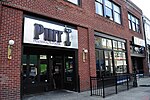The Capitol Hill Occupied Protest or the Capitol Hill Organized Protest (CHOP), originally Free Capitol Hill and later the Capitol Hill Autonomous Zone (CHAZ), was an occupation protest and self-declared autonomous zone in the Capitol Hill neighborhood of Seattle, Washington. The zone, originally covering six city blocks and Cal Anderson Park, was established on June 8, 2020, by George Floyd protesters after the Seattle Police Department (SPD) left its East Precinct building. The zone was cleared of occupants by police on July 1. Its formation was preceded by a week of tense interactions between protesters and police in riot gear which began on June 1 and escalated on June 7 after a man drove his vehicle into the crowd and shot a protester near 11th Avenue and Pine Street. Tear gas, flashbangs and pepper spray were used by police in the densely populated residential neighborhood. On June 7, the SPD reported that the crowd was throwing rocks, bottles, and fireworks, and were shining green lasers into officers' eyes. The next day, police boarded up their building and moved out of the East Precinct in an effort to de-escalate the situation.The zone was a self-organized space, without official leadership. Protesters united behind three main demands:
Cut Seattle's $409-million police budget by 50 percent.
Shift funding to community programs and services in historically black communities.
Ensure that protesters would not be charged with crimes.Participants created a block-long "Black Lives Matter" mural, provided free film screenings in the street, and performed live music. A "No Cop Co-op" was formed, with food, hand sanitizer and other supplies. Areas were set up for free speech and to facilitate discourse, and a community vegetable garden was constructed.The CHOP became a focus of national attention when President Donald Trump tweeted his disapproval on June 10 and 11, calling the occupants "ugly Anarchists" and demanding that Governor Jay Inslee and Mayor Jenny Durkan "take back" the zone. Durkan described the area on June 11 as four blocks with a "block party" atmosphere; on June 14, USA Today reported a festive environment and compared the protest to a miniature version of Burning Man. The New York Times later contrasted Durkan's words with descriptions provided by local businesspeople, however, reporting "encampments overtaking the sidewalks ... roving bands of masked protesters smashing windows and looting [and] [y]oung white men wielding guns ... harangu[ing] customers." The Star Tribune reported on June 22 that at night, the atmosphere became charged as demonstrators marched and armed volunteer guards kept watch. SPD Chief Carmen Best said that the department wanted to reduce its footprint, later clarifying that officials intended to return officers to the precinct to respond quickly to calls.On June 13, Black Lives Matter protesters negotiated with local officials about leaving the zone. The CHOP's size decreased four days later (when roadblocks were moved), and it continued to shrink after shootings in or near the zone on June 20, 21, and 23. Durkan responded that the SPD would return peacefully in the near future. On June 28, she met with protesters and informed them that the city planned to remove most barricades and limit the activist area to the East Precinct building and the street in front of it. That day, CHOP organizers expressed their intention to refocus on the area near the police station and away from the sprawling encampment at Cal Anderson Park after it became a political liability and they struggled to maintain security. In the early morning of June 29, a fourth shooting left a 16-year-old boy dead and a 14-year-old boy in critical condition with gunshot wounds. Calling the situation "dangerous and unacceptable", SPD Chief Best told reporters: "Enough is enough. We need to be able to get back into the area." On July 1, after the mayor issued an executive order, Seattle police cleared the area of protesters and reclaimed its East Precinct station. Protests continued in Seattle and at the CHOP site over the following days and months.










